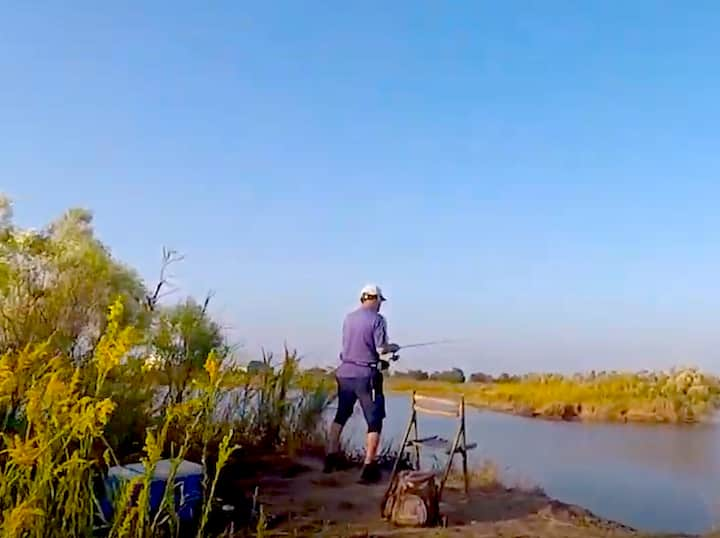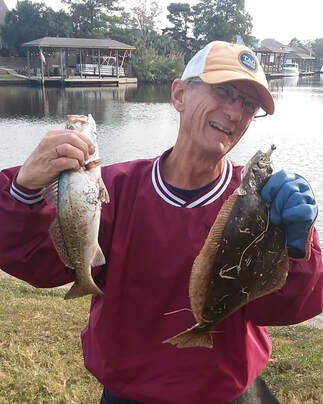Keith Lusher 05.13.24

When asked the question: Why do you fish? The answers that come from anglers often vary from, “It is relaxing” to “It is my job.” Fishing spans the gamut and spares no sociological boundaries when it comes to the type of folks who enjoy it.
If you ask Sam Coco Jr. of Slidell, LA, why he fishes, he’ll probably tell you, “Because… it’s my medicine!” and Coco’s not being facetious.
Coco grew up like any other South Louisiana boy, peddling his bike to the nearest bayou in search of whatever was biting. “Every day we would ride our bikes to some pond or canal nearby and catch catfish, bream, and bass,” he said.
When he was a teenager, he dared himself to go farther down the highway even riding his bicycle down main thoroughfares like Paris Boulevard in Chalmette LA. While the teen fished for freshwater fish, he knew where he could find saltwater after making a fishing trip with a family member. “Discovering that I could fish saltwater fish in Bayou Bienvenue was a game changer,” he said. “Once I showed my friends that, we would rent flatboats all the time to catch speckled trout and redfish.”
Coco’s addiction to fishing continued for the next decades. and as he got older, his love for fishing led him to make a move to a waterfront property in Slidell, LA in 1996. The home was one of many that were located along a set of man-made canals that fed into Lake Pontchartrain.
Living on the water, Coco had the option to fish from his boat any time he wanted. In addition to that, he could walk the neighborhood and fish from land. “There were all kinds of spots that were wide open. Sometimes I caught more fish from land than out of my boat,” Coco said.


But in 2003 Coco’s focus was distracted from fishing over to his health. “I remember sitting down with a cup of coffee one morning and as I was lifting my cup to my lips I saw the coffee inside trembling ever so slightly,” Coco said. “Then my leg started to stiffen up after returning home from jogging with my wife.”


Coco knew something was wrong so he called for an appointment with the family doctor and described his symptoms to the physician. The doctor referred him to a neurologist who examined Coco to determine that the symptoms were the ones associated with Parkinson’s Disease. Coco was given a prescription for Mirapex which is a drug used during the early stages of Parkinson’s. The prescription helped to alleviate the symptoms of the disease that cause involuntary shakes known as Dyskinesia. But the doctor also told Coco that Parkinson’s was a progressively degenerative neurological disorder that there was no known cure for. “He told me I would be able to live a fairly normal life for many years and I was good with that,” he said.
Coco stuck to his routine of taking the medicine and soon returned to his routine of fishing almost every day. Many years passed and the effects of the diseases became more noticeable.The disease progressed through the years and got to the point where Coco sometimes struggled to walk. However, he still managed to make his way to the shoreline to fish almost daily although it was a challenge.


As the Dyskinesia worsened, Coco started to fall. “I started to lose my balance easily and fall down even while fishing on a slanted shoreline,” Coco said. In 2017 Coco noticed something while fishing along a shoreline near his home. He was catching speckled trout that day and he was catching plenty.
After one particular cast, he set the hook on a trout and started reeling it in. As he was reeling he noticed that the Dyskinesia disappeared. He started to pay more attention to his body as he was reeling in fish and confirmed that his symptoms faded away during the process of setting the hook, reeling the fish in, and landing it.
At his next appointment with the doctor, Coco inquired about this phenomenon and was told that it was the release of dopamine that caused the momentary cure. So Coco did what any man would do. “I went home and told my wife that I had doctors’ orders to go fishing more, he joked.
Now Coco makes a special effort to keep active and fish more. And what began out years ago as simply something to do for fun, has turned into an important therapeutic routine for Coco. But the medicinal benefits he receives from fishing will always be a bonus to the neighborhood angler. Coco said it’s just an added incentive to do what he has always loved to do, “Dopamine or no dopamine, I’m still fishing just like I did when I was a kid!” said Coco.

